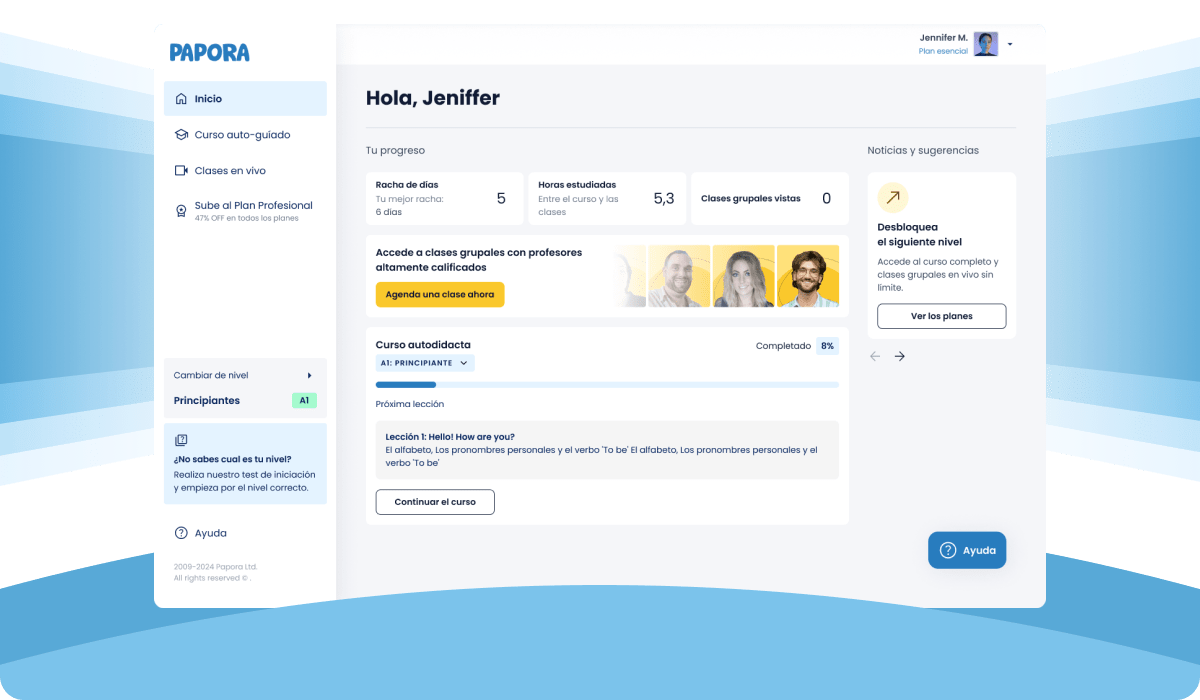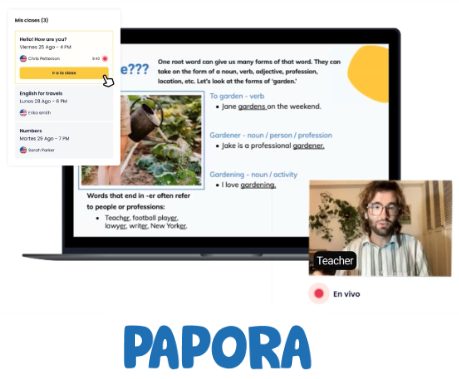We know that one of the factors that most affects pronunciation when learning English is a lack of confidence, practice, or fear of making mistakes when speaking in public.
But that won't be a problem anymore. We've created a list of the most common tips to help you improve your confidence, pronunciation, and fluency. That way, you can integrate them into your daily life and achieve your goals. Plus, we've saved the best tip for last!
1. Attend language exchanges
Participating in English exchanges has many benefits, such as:
- Unlock total fluency with full immersion—surround yourself with native speakers and start thinking in English from day one!
- You’ll boost your vocabulary with real, everyday expressions.
- You will perfect your accent and intonation
Look for the best options to do this, whether through travel, work, or directly studying at a school or club. Evaluate which courses (online or in person) suit your needs.
Master English speaking with Papora
Speak English confidently and fluently with the guidance of our expert native-level teachers. Start at A1 and get certified up to C1.
Sign up for free

2. Read aloud and record yourself
Sometimes when we speak aloud, it is more difficult to hear our pronunciation and identify mistakes. That is why recording yourself while you read is a surefire way to correct and improve.
Recording yourself while reading a book or love phrases in English will help you avoid feeling the pressure of being heard by others if you make a mistake.
You can strengthen your pronunciation naturally and effectively through trial and error.
To do this, use voice memo apps on your phone or recorders so that you can play back the audio as many times as you need. You can also use web translators with a microphone or sound so that you can practice the most complicated words.
“You can record yourself while practicing your oral skills and then listen to yourself. Also, ask your teacher about your progress and what you can do to improve, and ask them for exercises.”
3. Listen to and sing songs in English
Listening to content in English is one of the best ways to practice your listening skills, as it helps you pick up the correct sound of words and improve your pronunciation. If you also sing along, you'll have an extra boost that will guarantee greater fluency.
Although there are many songs for learning English, it's best to choose your favorite genre and artist. A prior connection will make it more fun and enjoyable.

4. Create an internal dialogue and think in English
This tip helps you prepare for different scenarios and contexts, improving verbal fluency and reducing mistakes when speaking.
This builds confidence and control, reinforcing the benefits of clear English in interviews, meetings, and everyday workplace conversations where misunderstandings carry consequences.
You can prepare dialogues in your mind or write them down based on the situation you expect to face. Focus on topic-specific vocabulary and practise using the present simple structure in conversations related to that context.
5. Do shadowing
This technique, which consists of listening to an audio or video and repeating it immediately afterwards, imitating the pronunciation, intonation, and rhythm as if you were following someone's shadow, can help you acquire a more natural accent, expose you to new expressions, and stimulate practice.
Choose a movie, series, podcast, or short song to apply this technique, preferably with subtitles or, in the case of a melody, find the lyrics to make the content and words to be repeated easier to visualize.
“To improve their English pronunciation, students must listen and repeat constantly. This, together with the rules of stress, will help you know where to place the emphasis on words, since there are no accents in English. Improving your English pronunciation requires practice, consistency, and desire.”
Speak English with confidence thanks to Papora's native-level teachers.
Practice in unlimited classes with experts and improve your fluency in a safe and flexible environment, updated and adapted to real English.
Book a class

6. Keep a vocabulary journal
In order to expand your vocabulary, you need to consume the language in many formats. An effective way to do this is by using media and resources that interest you to stay motivated and build a regular habit, which is especially helpful if you also want to feel more confident speaking British English.
We recommend writing down new words you learn, along with their definitions, so you can memorize them quickly. You can also write down some phrases or contexts in which you can use them to facilitate the retention process and find them when you need them. Always have a dictionary or translator handy.

7. Lose your fear of practicing
Practice is key to learning a language or anything else, but sometimes the fear of making mistakes can prevent you from doing so frequently, slowing down your progress and the optimal development of your skills.
Change your perspective on your mistakes and see them as opportunities, looking for new ways to practice the language or with whom to do so. Whether it's with your teachers, classmates, or joining a conversation group that provides a safe space that will help you feel comfortable and relaxed.
“To improve your speaking, you need to be more extroverted and not be afraid of making mistakes. Even if you make mistakes, the other person usually understands you. Communication is more important than speaking "perfectly."”
8. Do pronunciation exercises
The key to improving your pronunciation is to practice and understand the sounds and phonetics, especially the ones you find more difficult. To do this, you can use apps that teach you intonations, such as Word Reference, or do it the traditional way with expert teachers.
- Identify which sounds are the most difficult for you to learn.
- Record yourself using them in different words that have that intonation.
- Compare them with those of a native speaker.
- Keep in mind that your progress depends on your practice and consistency if you're looking to learn to pronounce like a native.
9. Participate actively in class
To improve your fluency and master the language, you only need constant practice, and one of the best ways to do this is to actively participate in class. You'll also have teachers who will guide you and correct your mistakes, helping you progress.
A good technique is to record your classes, if your teacher allows it, so you can review and listen to them again. Also, ask your teacher to point out aspects of your pronunciation that you can improve so you can focus on them and practice them in future classes.

The best advice: Learn English with Papora
Papora is an online English learning platform that you can use from anywhere, anytime, with just an internet connection. It allows you to schedule unlimited live classes with flexible schedules that fit your schedule.
✅ You'll have native-level teachers who will teach you the best tools to perfect your pronunciation.
✅ You can also practice what you've learned in real-life situations thanks to its more than 500 self-taught lessons, which you can repeat as many times as you need to consolidate your knowledge.
✅ You can certify each level from A1 to C1.

Take your speaking to the next level with real feedback from Papora!
Improve your pronunciation and fluency with effective techniques and live support from expert teachers.
Find out here

Frequently asked questions about improving your English speaking skills
While it's true that living in an environment where the language you're learning is spoken helps you constantly immerse yourself, there are other ways to improve your speaking, such as choosing an English course that meets your needs and includes conversational classes with experts.
To gain confidence when speaking English, you must keep in mind that it's a gradual process that requires daily practice, dedication, and patience. But at Papora, our experts recommend recording yourself, speaking out loud, or using resources like audiobooks to learn English to see faster progress.






